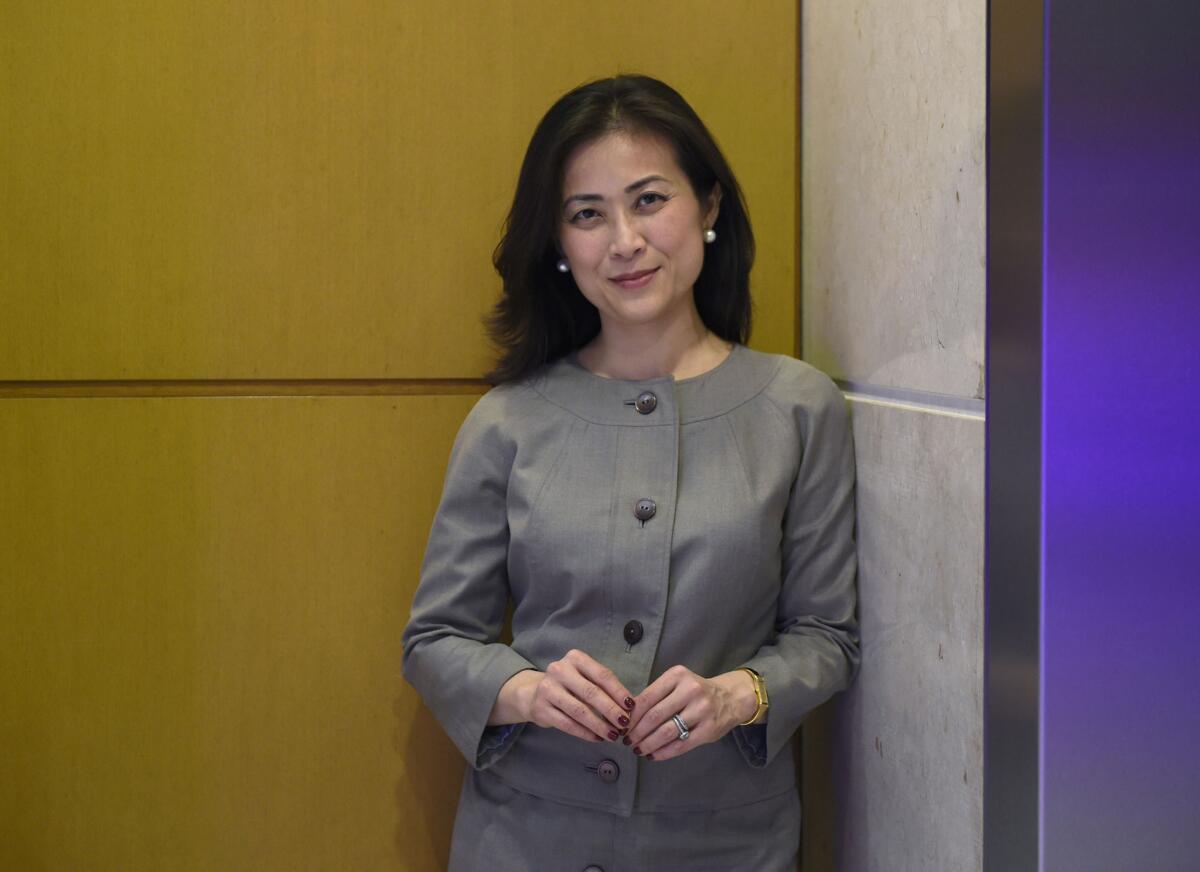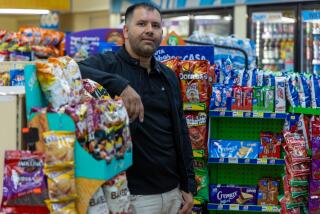She arrived as a refugee — and now she works at the White House

Elizabeth Phu, an aide to President Obama who works on southeast Asia policy, including refugee outreach, fled Vietnam herself as a young child with her family.
reporting from Kuala Lumpur — The pirates had a price: 10 wedding bands, in exchange for pulling the broken-down boat of Vietnamese refugees to the Malaysian shore.
A young father named Frank Phu saw no other way to save his wife and toddler daughter, so he collected the rings into a tiny sack, clamped it between his teeth and swam to the pirates’ ship to make the deal. Tugged by the pirates, the passengers made it near the Malaysian island of Pulau Penang, and eventually to a nearby refugee camp run by the government.
Over 36 years after arriving as a “boat person,” as the refugees were crudely called, the young girl, Elizabeth Phu, has come back to this southeast Asian nation -- this time as an American citizen and advisor to President Obama, part of the White House team accompanying him on his 10-day, three-country tour of world-leader summits.
Obama will visit a refugee school Saturday to highlight the plight of migrants in Asia as he makes a case that the world should open its arms to refugees fleeing troubled and war-torn homes, from Syria to Myanmar to Bangladesh. And though the stop has been planned for months, it now unfolds amid an unforeseen debate back home about whether it is time to close the U.S. to refugees instead.
This isn’t how I see our country. We’re a country that welcomes people in their time of need, people who just want to work hard and make a better life for their families.
— Elizabeth Phu, advisor to President Obama
“It’s so hard for me to hear,” says Phu, 39, who grew up in Oakland and has pursued a long career as a civilian advisor at the Pentagon and the White House. “This isn’t how I see our country. We’re a country that welcomes people in their time of need, people who just want to work hard and make a better life for their families.”
Back home in California, her mother has retired after a career as a nurse and raising two daughters. Her father still works at the same financial firm that employed him shortly after his arrival.
In Kuala Lumpur, Phu is still working to fulfill the dreams they had for her when they left Saigon. On Friday, she sat with White House staff in the audience as the president recalled his own roots in Southeast Asia – he even spoke a little Indonesian -- and explained just how important it was for him to deepen America’s engagement in the region, a task Phu is playing an important role in.
“It’s home to so much of humanity, home to some of the world’s fastest-growing economies. And that’s a key focus of my foreign policy,” he said.
Phu was just a toddler in 1978 when her family first tried to flee the country out of fear of the communist government. Her father worked for the U.S. Army during the Vietnam War.
They were caught and sent to a brutal “re-education camp,” though Phu was barely old enough to walk. Re-education camps were harsh places of hunger and overwork where intellectuals, religious leaders and employees of the old government were sent to “learn” the new government’s communist ways. Detainees were supposed to stay for a few weeks; Phu and her family were kept there for months.
Her grandparents managed to buy their freedom, and then sold everything they had to buy passage for Phu, by then close to 4, and her parents on a two-engine boat the size of a couple of hotel rooms. The pilot jammed 253 people into it before setting out, launching a journey that relatives have recounted to Phu many times over the years.
Soon, one of the boat’s engines died and the passengers floated aimlessly for three days, before the pirate boat pulled alongside and offered to pull the boat into Malaysian waters -- but only in exchange for the wedding bands.
Phu’s father collected the jewelry and swam to make the deal.
A heavy fog descended as they tried to pull into the island, only to run into a second set of pirates who ransacked the boat and smashed the water tanks. A woman on the Vietnamese boat died of a heart attack during the assault.
Adrift again for four days, the passengers finally attracted the attention of Malaysian authorities who pulled them to shore and took them to a refugee camp on nearby Pulau Bidong.
Phu’s first memories are of that camp. She recalls the town center where she played, and getting to tell nursery rhymes over the loudspeaker.
There was little food, and her parents sold their belongings to feed her. Her uncles hiked miles to get firewood.
“They let us stay there,” she said. “For that, I’m grateful.”
On Saturday, Phu will visit a new generation of children given refuge by the Malaysian government, alongside the president of the country to which she belongs.
“It’s deeply meaningful and personal,” said Phu. “We need partners like Malaysia who are there to help people desperate to make a better life ... and I’m proud of how much the United States does for refugees.”
In her years at the White House, Phu has helped Obama to shape policy on southeast Asia, a region crucial to the president’s view of the world in terms of trade and strategic alliances.
But while the president has been overseas trying to shore up U.S. partnerships in Asia to counter the rise of China and meeting with close U.S. allies in Turkey to strategize the fight against Islamic State, House lawmakers passed a bill that would block Syrian refugees from the U.S.
The legislation was a culmination of the fierce debate in the wake of last week’s Paris attacks over whether to allow refugees into the country, and the rhetoric has been distressing to the Obama team as it plans Saturday’s message, about welcoming strangers, not shunning them.
“Part of who we are as Americans is our openness to immigrants and to refugees who are fleeing from conflict or oppression,” said Benjamin Rhodes, Obama’s deputy national security advisor. “We can’t close our doors to those in need, and we need to support countries who are hosting refugees, like Malaysia, Jordan and Turkey.”
It’s not just a message of charity, said Rhodes, but one of self-interest.
“Refugees from Southeast Asia have become successful in the U.S. and contributed a great deal,” he said. “It has been to our benefit.”
Phu’s story is the kind the administration points to for evidence. She graduated from Miramonte High School outside Oakland and attended college at UC Berkeley and graduate school at UC San Diego.
For the last three years, she has been detailed to the National Security Council staff at the White House, serving now as director for Southeast Asia and Oceania affairs.
The story of her family’s escape from Vietnam she tells easily. Describing her current stature causes her voice to crack.
“A refugee from a communist country can come here and grow up in the U.S. and have the privilege of working in the White House,” she said. “It makes me so proud to be an American.”
Memoli reported from Kuala Lumpur and Parsons from Washington.
For more White House coverage, follow @cparsons and @mikememoli
ALSO
A look at the roots of militant violence in Mali
Pentagon has increased military operations in Africa
Israel hails U.S. release of convicted spy Jonathan Pollard
More to Read
Sign up for Essential California
The most important California stories and recommendations in your inbox every morning.
You may occasionally receive promotional content from the Los Angeles Times.












